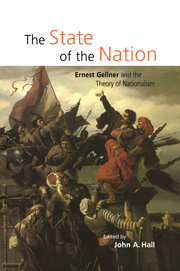Introduction
Published online by Cambridge University Press: 05 December 2011
Summary
The most striking way in which Ernest Gellner stood apart from the rest of his generation of postwar social scientists was in his concentration on nationalism. The neglect of nationalism within the academy after 1945 is easily explained: as is often the case, geopolitical events set the intellectual agenda. Nationalism was blamed for the onset of war in 1939; as statesmen paid no attention to national self-determination when dividing Germany and Korea, so scholars in their turn ignored nationalism. If there was some interest, not least in the case of Gellner himself, in decolonisation and in nation-building in the new states that resulted, it remains the case that generalised intellectual attention turned to nationalism only in the 1980s – interestingly and puzzlingly slightly before the break-up of the last Eurasian empire made nationalism a central topic of public concern. In these circumstances, Gellner's theory of nationalism, first adumbrated two decades earlier, suddenly received enormous attention, with Nations and Nationalism becoming an influential, much translated bestseller.
The circumstances of Gellner's life which made it utterly impossible for him ever to have neglected nationalism are well worth bearing in mind as background to the studies assembled in here. Both his parents were lower middle class Bohemians of Jewish background who changed their allegiance, from the German to the Czech community, to accommodate themselves to the way in which sheer demographic weight created a new form of society in Prague at the end of the nineteenth century.
- Type
- Chapter
- Information
- The State of the NationErnest Gellner and the Theory of Nationalism, pp. 1 - 20Publisher: Cambridge University PressPrint publication year: 1998
- 2
- Cited by

